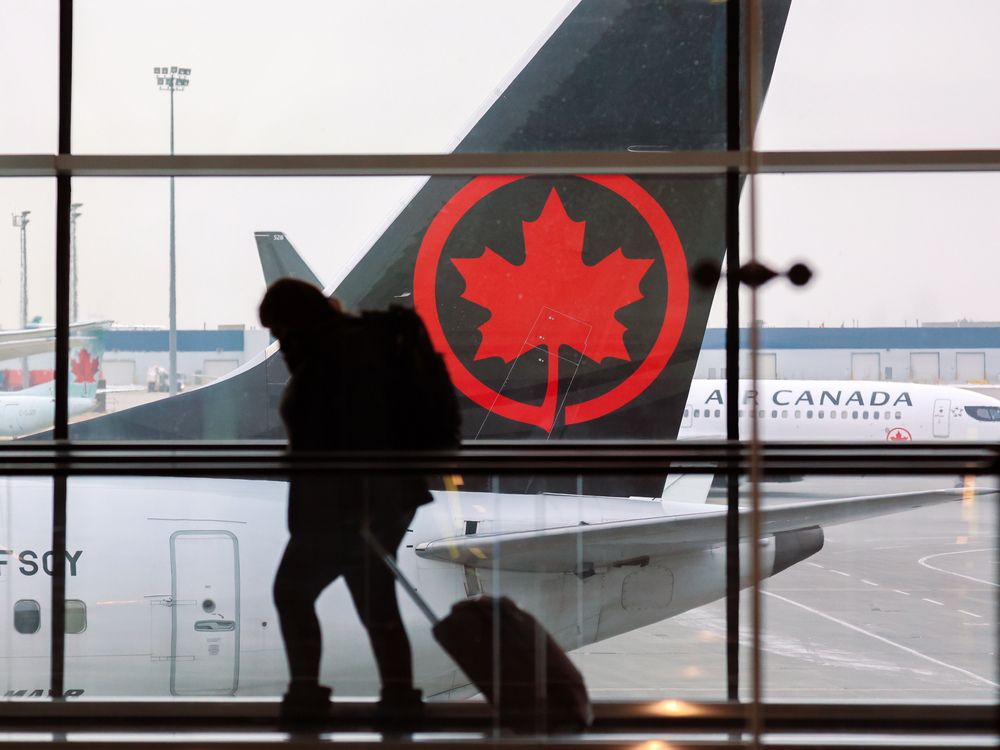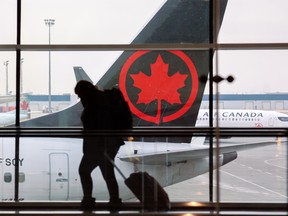Air Canada struggles to achieve altitude as fuel costs rise

Net loss per share of $2.72, narrower than a year earlier, still wider than many Wall Street analysts were expecting

Article content
Montreal-based airline Air Canada reported a net loss of $550 million in the first quarter of 2022, slightly worse than the previous quarter, as rising fuel costs and the war in Europe outweighed gains from growing demand for travel.
Advertisement 2
Story continues below
Article content
The net loss per share was $2.72, narrower than a year earlier, but still wider than many Wall Street analysts were expecting. Stephen Trent of Citigroup Global Markets described the results as “mixed,” telling his clients in a note that while Air Canada appears to be taking “helpful actions” to boost revenue, its process “seems slower” than many of its American rivals.
Air Canada shares dropped about four per cent, and were trading around $23.25 at around 11 a.m. Toronto time.
As travel restrictions ease, the company is bouncing back from the blow it suffered from the pandemic, but it’s a far cry from 2019, when the company reported net income of $1.7 billion. Like most airlines, Air Canada has been operating at a loss since early 2020, running a deficit of $3.8 billion that year, and a shortfall of $3 billion in 2021.
Advertisement 3
Story continues below
Article content
Lucie Guillemette, executive vice president and chief commercial officer, said she did not expect things to bounce back to pre-pandemic levels just yet. “To reach 2019 levels this summer would not be achievable,” she said on a call with analysts after the company released its latest quarterly results on April 26. The airline plans to operate at 20 per cent below capacity this summer.
Air Canada has experienced a spate of bad press in recent months. Last November, CEO Michael Rousseau made headlines when he made a 26-minute speech in English to the Montreal Chamber of Commerce with just 20 seconds of French. He later told reporters that he hadn’t felt the need to learn the language in his 14 years in Montreal, sparking backlash. Rousseau promised to learn French as a result.
Advertisement 4
Story continues below
Article content
The incident wasn’t mentioned on the analyst call. Management attributed the ongoing operating losses to rising fuel prices, the conflict between Russia and Ukraine, and the Omicron variant.
Amos Kazzaz, executive vice president and chief financial officer, said that the rising cost of fuel would be counteracted by increasing fares. “We believe that much of this increase can be recovered through fares, other revenue authorization tools as well as through our continuing focus on cost-reduction initiatives,” he said.
-

‘Flair Airlines is here to stay,’ CEO assures passengers in fight to keep flying in Canada
-

Air Canada to suspend flights between Vancouver and Delhi this summer due to Ukraine-Russia conflict
-

Air Canada to increase full-year capacity on higher travel demand
-

Air Canada to add 26 Airbus A321neo aircraft as travel demand rebounds
Advertisement 5
Story continues below
Article content
As travel restrictions continue to ease in Canada, the airline’s executive team remains optimistic that performance will continue to improve. “Traffic is returning. Revenues are growing. Our network is being restored,” said Rousseau. “And our finances, including our liquidity position, are very strong.”
Indeed, the tides may be turning for the airline. On April 15, the company met a milestone, flying over 100,000 customers in a single day for the first time since March 2020. The company is also making significant changes to the composition of its fleet, said Kazzaz. The company is expanding Air Canada Cargo, the company’s shipping arm, and has added two new Boeing 767-300 freighters to its fleet, which will be delivered in 2022.
“Our long-range plan is for yields to come back to 2019 levels,” said Rousseau. “The wild card, to some degree, is Asia, and how fast that comes back, and what kinds of disruptions that they have,” he added. “As you know, Asia is a fairly strong cargo market and we’ve taken full advantage of that, but obviously with total shutdowns of Shanghai and Beijing, it’s going to affect some short-term performance of cargo.”
• Email: mcoulton@postmedia.com | Twitter: marisacoulton
Advertisement
Story continues below









